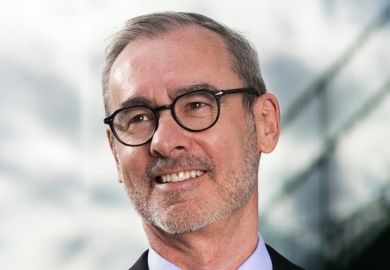Canada’s largest online university is hitting political complications as it tries to grow a more global audience, confronted by provincial demands to prioritise the institution’s importance as a rural employer.
The 43,000-student Athabasca University – headquartered nearly 200 miles (300km) north of Calgary – has long let most of its staff work remotely as it expanded its enrolment from Alberta to the rest of Canada and then abroad.
But now, as even more workers choose virtual options after the Covid pandemic, Alberta’s governing United Conservative Party has been moving to shore up its rural support by insisting that the university’s leaders and hundreds of staff live nearby.
The university should be understood as having a “dual purpose” of both higher education and job creation in the remote 3,000-person community of Athabasca, said the province’s minister for advanced education, Demetrios Nicolaides.
“I don’t think there’s an order of preference, or an order of superiority” between those two objectives, Mr Nicolaides told Times Higher Education.
Athabasca’s former president, Neil Fassina, moved out of the area in 2018 with most of his top staff. The current president, Peter Scott, is suggesting that he might do the same thing. Professor Scott took office in January, and in a note last month to the university community he rebutted promises by now-ousted premier Jason Kenney and Mr Nicolaides that they would rebuild the university’s in-person presence.
The university remains committed to its mission as Canada’s only public research-intensive institution that offers fully accredited online courses, Professor Scott said. The local community’s economic needs were worthy of attention, he said in the note. But he added: “The university will continue to prioritise the needs of our more than 43,000 learners worldwide by ensuring we continue to hire and retain the best and the brightest talent.”
Some experts agreed that hunts for top candidates for key university positions could suffer alongside a mandate for Athabasca residency.
“Many instructors with PhDs – and their partners – would not necessarily want to move to this small town with limited services and access to cultural institutions and the like,” said David Scott, an associate professor of education at the University of Calgary. “Thus it becomes very difficult to recruit high-quality faculty if there is a residency requirement.”
Marc Schroeder, an associate professor of mathematics and computing at Mount Royal University, viewed the Athabasca dispute as part of broader tension between the United Conservative Party and academia.
“University autonomy is an important principle to respect,” Professor Schroeder said, “and I don’t think the government should be trying to step in and micromanage.”
Athabasca University was founded in 1970, developed an early emphasis on distance learning, and was moved from Edmonton to Athabasca in 1984 to help promote rural job growth. Even then, the strategy was controversial, with the relocation leading to the resignations of the university’s president, a third of its professional staff and two-thirds of its support staff.
Most faculty still teach remotely, and the university’s Athabasca facility has largely housed just administrators and technical staff. Even before Covid, however, the Athabasca headquarters was experiencing another steady decline in the number of in-person staff, led by Dr Fassina. The number of top administrators working in Athabasca fell from 18 in 2016 to five in 2019. Only about 250 of the institution’s 1,200 employees now work in the town, down from about 300 before Covid.
“What I’m asking the university to do,” Mr Nicolaides said, “is just to continue doing what they’ve been doing for the past several decades.” Yet, he added: “I don’t agree with the assertion that government is meddling in the affairs of the institution.”
Register to continue
Why register?
- Registration is free and only takes a moment
- Once registered, you can read 3 articles a month
- Sign up for our newsletter
Subscribe
Or subscribe for unlimited access to:
- Unlimited access to news, views, insights & reviews
- Digital editions
- Digital access to THE’s university and college rankings analysis
Already registered or a current subscriber?








